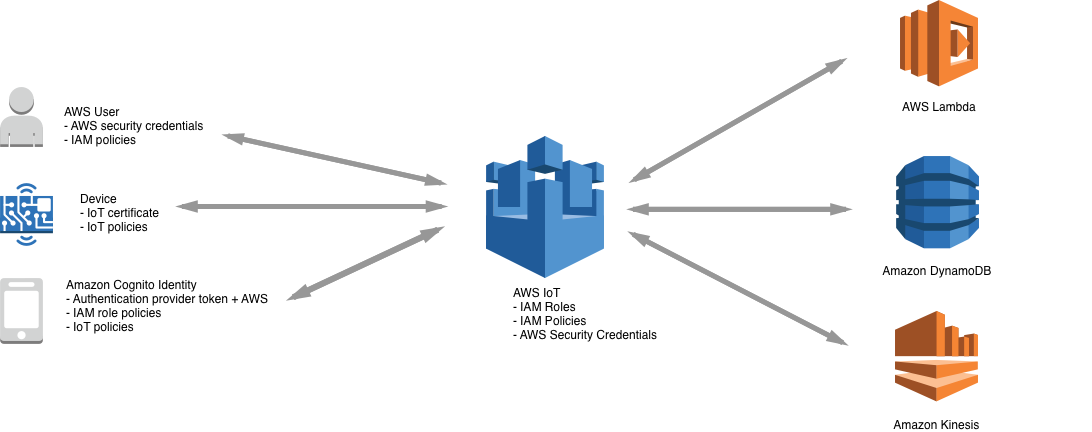MQTT
YouTube search... ...Google search
- Telecommunications ... Computer Networks ... 5G ... Satellite Communications ... Quantum Communications ... Communication Agents ... Smart Cities ... Digital Twin ... Internet of Things (IoT)
- Predictive Analytics ... Predictive Maintenance ... Forecasting ... Market Trading ... Sports Prediction ... Marketing ... Politics ... Excel
- Robotics ... Vehicles ... Drones ... 3D Model ... 3D Simulation Environments ... Simulated Environment Learning ... Point Cloud
- Time ... PNT ... GPS ... Retrocausality ... Delayed Choice Quantum Eraser ... Quantum
- DeepLens - deep learning enabled video camera
- More DeepLens Projects
- Product page...
- MQTT.org
- AWS IoT Button
- AWS Internet of Things (IoT)
MQTT (MQ Telemetry Transport) is a publish/subscribe, extremely simple and lightweight messaging protocol, designed for constrained devices and low-bandwidth, high-latency or unreliable networks. The design principles are to minimize network bandwidth and device resource requirements whilst also attempting to ensure reliability and some degree of assurance of delivery. These principles also turn out to make the protocol ideal of the emerging “machine-to-machine” (M2M) or “Internet of Things (IoT)” world of connected devices, and for mobile applications where bandwidth and battery power are at a premium. NOTE: MQTT does NOT support queuing, so 'Message Queue Telemetry Transport' term isn't used any longer.

Research involving MQTT (Message Queuing Telemetry Transport) and AI can focus on various areas where the combination of these technologies can bring benefits. Here are a few examples:
1. IoT Data Communication and Analysis: MQTT is a lightweight messaging protocol widely used in IoT applications. Researchers can explore how to integrate MQTT with AI techniques to efficiently transmit and analyze data from IoT devices. For instance, AI algorithms can process MQTT messages to identify patterns, anomalies, or predictive insights in real-time, enabling proactive decision-making.
2. Edge Computing and AI: MQTT is commonly employed in edge computing scenarios, where AI algorithms are deployed on local devices rather than relying solely on cloud resources. Researchers can investigate how MQTT can facilitate efficient communication between edge devices and AI models. This can involve optimizing MQTT message formats, exploring data compression techniques, or developing AI algorithms specifically designed for resource-constrained edge devices.
3. Intelligent Energy Management: MQTT can be leveraged to create intelligent energy management systems that incorporate AI capabilities. For instance, researchers can design AI models that learn from MQTT-based energy consumption data to optimize power usage in buildings or manufacturing facilities. MQTT messages can facilitate real-time monitoring, control, and coordination of energy-related devices, while AI algorithms can make predictions and recommendations to optimize energy efficiency.
4. Predictive Maintenance: MQTT can play a vital role in implementing predictive maintenance systems enhanced with AI. By collecting real-time data from IoT sensors installed on machines or equipment, MQTT can transmit this data to AI models. The AI algorithms can analyze the data, detect anomalies, and predict maintenance needs, enabling proactive maintenance actions. MQTT ensures efficient and timely delivery of sensor data to the AI models, facilitating predictive maintenance.
5. [Transportation (Autonomous Vehicles)|Smart Transportation]]: MQTT combined with AI can enhance various aspects of smart transportation systems. For example, researchers can explore how AI algorithms can process MQTT-based data from traffic sensors, GPS trackers, or public transportation systems to optimize traffic flow, improve route planning, or enhance public transportation schedules. MQTT's publish-subscribe model allows efficient dissemination of real-time data, while AI algorithms can process this data to make intelligent decisions and optimize transportation systems.

Message Queuing Telemetry Transport (MQTT); a lightweight messaging protocol (publish/subscribe) for small sensors and mobile devices, optimized for low bandwidth, high-latency or unreliable networks.